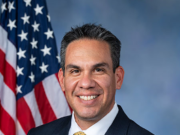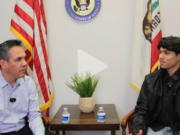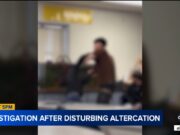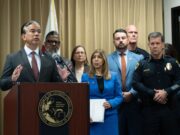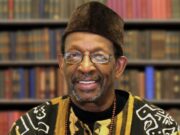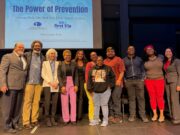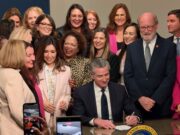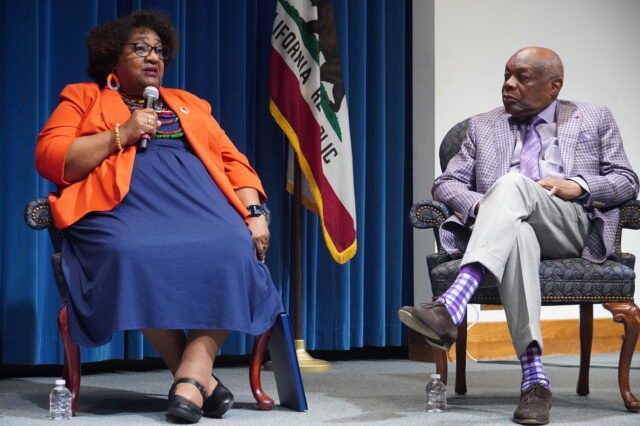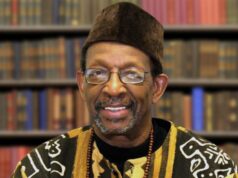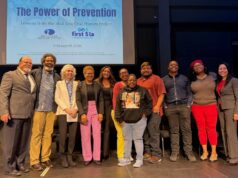By Antonio Ray Harvey | California Black Media
While serving a 14-year prison sentence, Adam Cain says he learned how vital it is for citizens to have the power to participate in democracy through voting.
But formerly incarcerated people who had completed their prison terms and were placed on parole, couldn’t always vote in California.
They gained that access to voting in 2020 through Proposition (Prop) 17 when voters approved a ballot measure that restored voting rights to about 50,000 people on state parole for felony convictions. Before Prop 17 passed, the state’s constitution prohibited people with felony convictions from voting until they had completed both their prison and parole terms.
While he was locked up, Cain’s said he got involved in advocacy to pass the bill, which was introduced by former Assemblymember Kevin McCarty (D-Sacramento) as Assembly Constitutional Amendment (ACA) 6.
His mission, Cain added, was to organize on the “inside” to see that the bill got passed by educating family and loved ones about the policy.
“Once I learned (about Prop 17), I was like ‘this is how I can get involved.’ So, we continued to push and make changes to open up voting rights for people who are coming home if you’re paroled or on probation,” Cain said. “We began doing a lot of organizing, using the inside-outside approach, working from the bottom to the top.”
Cain shared his experience, speaking at California’s 60th Anniversary celebration of the Voting Rights Act of 1965, held at the Secretary of State’s office in Sacramento on August 25.
Hosted by Secretary of State Shirley N. Weber, Cain was one of five guests on a panel that included Willie Brown, Speaker Emeritus of the California State Assembly; Melba Pattillo Beals, journalist, educator, and a member of the Little Rock Nine, who integrated Central High School in 1957; and Lexie Tesch, representative of the League of Women Voters. Guy Marzorati from KQED was the panel moderator.
Currently, Cain is an advocate and Program Coordinator for the abolitionist organization Initiate Justice, which works to end mass incarceration in California by empowering impacted people. It organizes and educates incarcerated people and individuals who have been released on how to advocate for systemic change.
According to the League of Women Voters, three of every four men exiting California prisons are either African American, Latino, or Asian American. Black Americans are four times more likely to experience felony disenfranchisement than are White Americans.
Cain said he went through a “transformation” while he was behind bars that led him to advocate for Prop 57, also known as the Public Safety and Rehabilitation Act of 2016. The measure, which addressed prison overcrowding by making it easier for nonviolent felons to be considered for parole, was authored and sponsored by then-Governor Jerry Brown.
The Voting Rights Act of 1965 is a landmark federal law, signed into law by President Lyndon B. Johnson on Aug. 6, 1965. It prohibits racial discrimination in voting. Its initial goal was to eliminate barriers that prevented African Americans from voting, particularly in Southern, formerly slave-holding states.
“I hope folks realize, I sometimes wonder as I look at what we’re doing today, that people understand the connection between your right to vote, the outcome of voting, as well as the politics,” Weber said in her remarks at the Sacramento commemoration.
“We’ve done a lot of things with the community in terms of voting, whether it’s the vote-by-mail issue or allowing young men who were incarcerated, those on probation or parole to have the right to vote. Those kinds of things didn’t exist in many places in California and still don’t exist across the nation. We’ve opened those opportunities,” Weber stated.
Brown’s statement echoed Weber’s, adding that the Voting Rights Act has been amended several times to extend its safeguards.
“From that point on, the business of Black votes began to impact who would be making the decisions and enforcing the rights,” Brown said. “We did all these things all for the single purpose of getting every single, solitary soul the opportunity to vote.”
Following the panel discussion, the event included a special exhibit titled “The Journey to Democracy” curated by the California State Archives.
The exhibit, on display at the State Archives and open to the public, features authentic documents and black-and-white photographs from the State Archives, the Library of Congress, and the Lyndon B. Johnson Presidential Library. It showcases how California’s history relates to voting rights and the Civil Rights Movement, challenging the perception that these issues were only in the Deep South. The exhibit is located on the fourth floor of the State Archives building and will be on display for one year.
“We want to remind folks what the Voting Rights Act of 1965 is and the people who were a part of it, lived through it, and understood why it was so important for us to have it,” Weber said.



